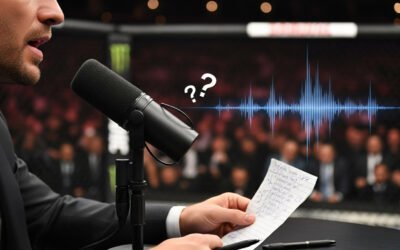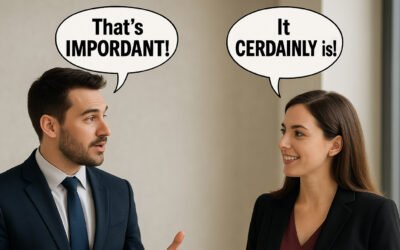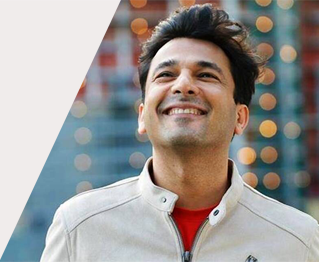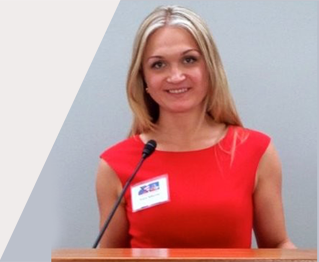From attorney arguments to witness testimonies, credibility in the courtroom is a key element of legal success. And when it comes to building trust on the stand, clear and confident communication can make a world of difference. Witnesses who struggle to articulate their points—whether due to non-standard accents, industry jargon, or public speaking anxiety—risk undermining their own credibility. Worse, opposing counsel may seize upon these perceived vulnerabilities, amplifying doubts in the minds of jurors or judges.
As a speech coach specializing in witness preparation, I’ve worked with litigators across legal practice areas,* their clients, and expert witnesses. The goal: to help refine communication for depositions and trials, including cross-examinations. Analyzing and refining the delivery of testimony—including pronunciation, syllable and lexical (word) stress, intonation, word choice, syntax (word order), gestures, posture, eye contact, and other spoken and unspoken communication choices—can empower individuals to present themselves not just clearly and confidently but credibly and compellingly in the courtroom.
For non-native English-speaking witnesses, communication challenges are amplified by potential juror biases and linguistic barriers, which can lead to damaging misconceptions.
Let’s dive into some key areas for consideration when determining the why and the how of speech coaching for legal testimony as part of witness preparation:
1. Specific Challenges Witnesses Face in the Courtroom
Whether native or non-native English speakers, witnesses face a variety of challenges that can impact their credibility:
a. Accent and Clarity
Non-native English speakers or individuals with regional accents (or any dialect that is difficult for the jury to understand) may struggle to tell their story or get their point across. Non-standard pronunciation patterns hastened or irregular pacing, or unfamiliar intonation, can make their testimony harder for jurors or judges to follow. These issues with courtroom communication skills may inadvertently create a perception of incompetence or even dishonesty. It’s an unfair reality faced by many witnesses who grew up in a region or country different than the constituents of a tribunal.
b. Jargon and Over-Explaining
Expert witnesses, such as doctors or engineers, often rely on industry-specific terminology. Without proper coaching, they may overwhelm jurors with a deluge of detail or assume knowledge or a perspective that their audience does not possess. Speaking over the heads of the jurors can alienate them—and if they don’t follow the testimony, the witness may lose their favor. Clear is kind, and concise is crucial.
c. Nervousness and Anxiety (and a Perceived Lack of Confidence)
A formal courtroom environment imposes such a unique pressure that it can cause even the most confident of individuals to falter. Witnesses may rush the speed of their responses, speak before they think or structure their stories, avoid eye contact, or exhibit body language that undermines their credibility. It’s not just what the witness said, but how they conveyed the information that makes an impact.
d. Juror Biases
Unconscious, subconscious, or even conscious biases can influence how jurors perceive a witness’s competence and trustworthiness. For example:
- Jurors may distrust educational credentials from unfamiliar “foreign” institutions.
- Jurors may conflate the challenges of a witness to testify clearly with that individual’s ability to perform on the job. Ex. Jurors can misinterpret a doctor’s difficulty in articulating testimony with that doctor’s ability to give clear instructions to a patient (or a colleague).
- Cultural differences in nonverbal communication, such as avoiding direct eye contact, may be mistaken for evasiveness.
- Lack of confidence in communicating in English under pressure may seem like a lack of confidence in medical or other treatment decisions.
- Opposing counsel could amplify the above to paint the picture (or misconstrue) that the witness is unprofessional or lacks competence.
e. Vulnerability to Opposing Counsel
Opposing counsel will aim to exploit any weaknesses in a witness’s communication, especially problematic for non-native speakers who may get increasingly intimidated or flustered when nervous. During cross-examination, the adversary may pounce – capitalizing on exposing unclear answers, word inconsistencies, or generalized nervousness to cast doubt on a witness’s reliability. And, worse, it is likely for the added duress of a pointed interrogation to exacerbate the situation, both linguistically and emotionally, for the foreign-born witness.
2. How Speech Coaching Provides a Strategic Advantage, Critical to Witness Credibility
My strategic approach to speech coaching addresses these challenges head-on, equipping witnesses with tools they need to communicate effectively under pressure.
a. Enhance Accent Clarity and Pronunciation
- Refine pronunciation— Triage articulation challenges in order of importance. If time is limited, start by focusing on key words (names, terms, common function words, and words and phrases likely needed to express important elements of the testimony). If time permits, perform an assessment to evaluate diction, and use the accent reduction (accent modification) and implement strategies needed to help the witness learn standard pronunciation patterns.
- Adjust pacing— In most cases slow the client way down in practice since courtroom nerves will likely add unintended pace during the actual trial. Encourage the witness to pause to breathe and to think when needed and express that action to the lawyer, judge, or jurors as appropriate.
- Use Intonation purposefully to convey intended meaning— Intentionally use stress (loudness, pitch, pace, and careful articulation) to highlight operative words, show contrasts, or create lists. This way, the judge and jury understand the witness’s statements with maximum clarity.
b. Simplify Complex Concepts
- Coach expert witnesses to “translate” technical jargon into layman’s terms. Show the witness how to explain to the lowest common denominator as far as prior knowledge.
- A good exercise is to pretend you’re explaining the complex concept to a 10-year-old by building an understanding step-by-step, but without making the jury feel you are “dumbing down” material or talking down to them. It’s walking a tightrope, but delivery and attitude can certainly help sell it. The key is to be intentional about striking that delicate balance between accessibility and expertise.
- Structure testimony to ensure you explain concepts from simple to complex. As for stories, keep actions in sequential or chronological order so a jury can follow clearly. Be careful that structure and grammar do not bely the testimony. Past tense would typically be used to tell a story (unless an attorney feels it’s more compelling in a case where you need the jury to feel they are right there with you.) Ex. I spoke with Maria, and then I filed a report. In contrast, present simple tense can express a habitual action. Ex. I see patients on Mondays and Thursdays. I share incoming complaints directly with my supervisor and document them in writing. Clarity in form will help with impact and avoid confusion.
c. Anticipate and Address Bias Proactively (Unfair yet Realistic)
- Help witnesses frame their credentials strategically. As opposed to a story told in sequential order, a reverse chronological rendition of a résumé may be helpful in building credibility faster. For example, if describing where a physician was credentialed, it may be advantageous to begin with the most recent schooling from a US-based education institution and then work backwards to the doctor’s early career overseas. Name recognition, and the familiarity that comes with it, may help establish trust in the jury box.
- Teach witnesses to adopt nonverbal communication choices that are culturally appropriate and familiar to jurors. For example, nodding one’s head may be a polite sign of acknowledgment in other cultures—and while it can be that in the US, it also shows agreement. For example, if challenged by the adversarial attorney during cross-examination, you don’t want to nod your head while they speak unless you mean to agree with their statements. Keeping still while looking in the eyes of the opposing counsel, or shaking your head no, would be a more appropriate motion to show you are listening but not in agreement. Using gestures to punctuate key points, refraining from fidgeting, and making eye contact with examining attorney and/or the jury (depending on the situation and preferences of counsel) are equally important in building rapport with the courtroom audience.
d. Put it All Together—and Build Confidence!
- Have a dress rehearsal (or many) of the deposition or trial to make the practice feel real. See what elements shake out as weaker during this stress test.
- For best results, practice with the attorney or law firm. They can most accurately lead role-play exercises to simulate both counsel and opposing counsel (so the client/witness can focus on speech in both direct and cross examination scenarios). Train witnesses to keep their composure and remain calm and when faced with aggressive questioning from the opposite side. That includes practice justifying their decisions under pressure and responding to misleading “gotcha” questions without appearing defensive.
- Reinforce positive body language, including appropriate eye contact, upright posture, and supporting gestures. Remind witnesses that the goal is to portray themselves as competent, honest, and approachable. Encourage implement strategies to manage anxiety, such as pacing and breathing techniques.
3. Making the Case for Integrating Speech Coaching into Witness Preparation Across Legal Specialties and Practice Areas
Clear communication in court is vital for all types of witnesses, not just defendants. Consider these scenarios:
- Medical Malpractice Defense: A doctor on trial for alleged negligence must testify with authority and clarity, avoiding misunderstandings caused by a regional or other non-standard accent (or any dialect sounding noticeably different than the judge or jurors), technical jargon, or wrong assumptions about the prior or shared knowledge of jurors.
- Personal Injury Cases: Plaintiffs recounting traumatic events must convey their experience authentically without appearing too rehearsed or, on the other extreme, so emotional that it interferes with the witness’s ability to clearly articulate their testimony. Recounting a story in a clear, sequential, and orderly way is vital.
- Criminal Defense and Prosecution: Witnesses must remain calm and confident under intense cross-examination, presenting a narrative that feels truthful and relatable. The skill of storytelling from a clear and authentic perspective is key to gaining juror’s trust, so testimony is received as credible and honest.
- Mass Tort Litigation: Expert witnesses explaining scientific or technical evidence must balance their precision with clarity and accessibility for lay audiences like jurors. Aiding jurors to grasp a complex matter will position the witness as a trusted advisor as opposed to a talking head giving lip service to help the counsel who hired them.
- Immigration Hearings: Defendants and expert witnesses must articulate their case effectively in front of a judge, especially in emotionally charged situations. Many immigrants may be native speakers of languages other than English. In this case, “negative transference” may occur, affecting the non-native-speaker’s pronunciation and the potential use of false cognates (ex., the word for pregnant in Spanish sounds very similar to the word embarrassed in English).
- Entertainment Law Disputes: Litigators representing high-profile clients may need to prepare witnesses for depositions or testimony in cases where public perception matters as much as the legal outcome. It may be of utmost importance for the defendant or plaintiff to come across as grounded, practical, reasonable, and humble to make a favorable impression on jurors.
In each case, the stakes are high, and communication gaps can shift the balance of power and apparent competence, believability, trustworthiness in the courtroom.
Conclusion
Clear, confident communication is not just a courtroom advantage—it’s a necessity. Witnesses need to overcome communication challenges in the courtroom, mitigate bias, and build trust with jurors and judges alike. Litigators want to help their clients and witnesses prepare in a way that leads to the best possible outcome.
Speech coaching provides witnesses with the tools needed to overcome linguistic and cultural barriers, present themselves authentically, and inspire trust. Therefore, developing a specialized communication methodology, and possibly working with a trained speech coach, is a tactic that litigators should seriously consider. This additional layer of strategy may serve as the perfect complement to an attorney’s routine witness preparation. It’s not enough to find a winning argument unless you also coach a winning delivery.
Eager to Learn More About the Speech Strategy for Your Law Firm?
Let’s ensure your legal team has the strategic edge in court. We can work together to ensure your witnesses deliver testimony that makes an impact—clear, confident, credible, and compelling.
Contact Melanie today to learn more about Speech Fox’s speech coaching services can support your next case. From pronunciation to word choice (diction) to delivery for both medical English and Legal English for non-native speakers, Melanie can help you take a strategic and comprehensive approach to witness preparation, even with a limited timeframe. Together, we can help you and your clients and (expert) witnesses build trust, break barriers, and strengthen your defense.
ABOUT MELANIE AND SPEECH FOX LLC
Melanie Fox of Speech Fox LLC has a deep understanding of how culture and communication intersect, making her coaching highly effective for diverse clients. She coaches public speaking for defendants and plaintiffs as well as witnesses and expert witnesses as well as attorneys themselves to speak and present clearly and confident in and outside of a courtroom. She is trusted by firms and insurance providers like MedPro and MLMIC for delivering measurable results. Melanie can deliver in-person (typically within NYC) and virtual coaching to accommodate clients worldwide.
Speech Fox is a diversity supplier (WBE, WOSB, SBE, and DOBE).
*I’m most often called to help in medical malpractice defense cases (for doctors, nurses, physician assistants, and other healthcare providers). I’d presume medmal defense leads the charge in my witness communication prep engagements, because of a few factors:
(1) The cases involve a lot of complex information and require a lot of precision in delivering detailed accounts.
(2) The defendants or expert witnesses tend to have a propensity to care deeply about their credibility, as it reflects on their professionalism and status.
(3) The defendants or expert witnesses likely have a mindset for serious or intense study, i.e. as with medical doctors, they have earned advanced degrees, certifications, and medical subspecialties.
(4) The cases likely feel ultra-high stakes to the defendant, as being held liable can have serious repercussions on their future employment (or medical practice) and related income.
(5) Medical Malpractice Insurance or Medical Professional Liability Insurance (from companies such as Berkshire Hathaway, MedPro Group, and Medical Liability Mutual Insurance Company | MLMIC) often helps pay for the services, as opposed to having the client or the law firm solely absorb the costs for these specialized services.















